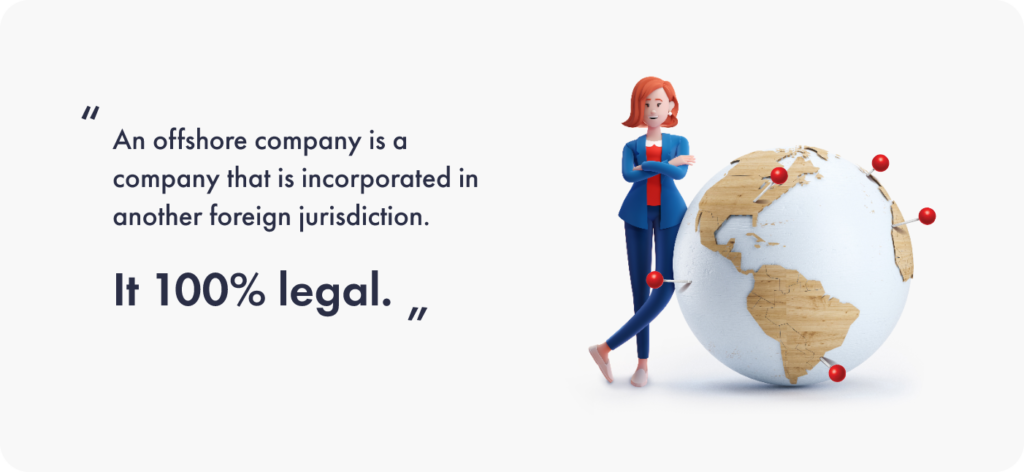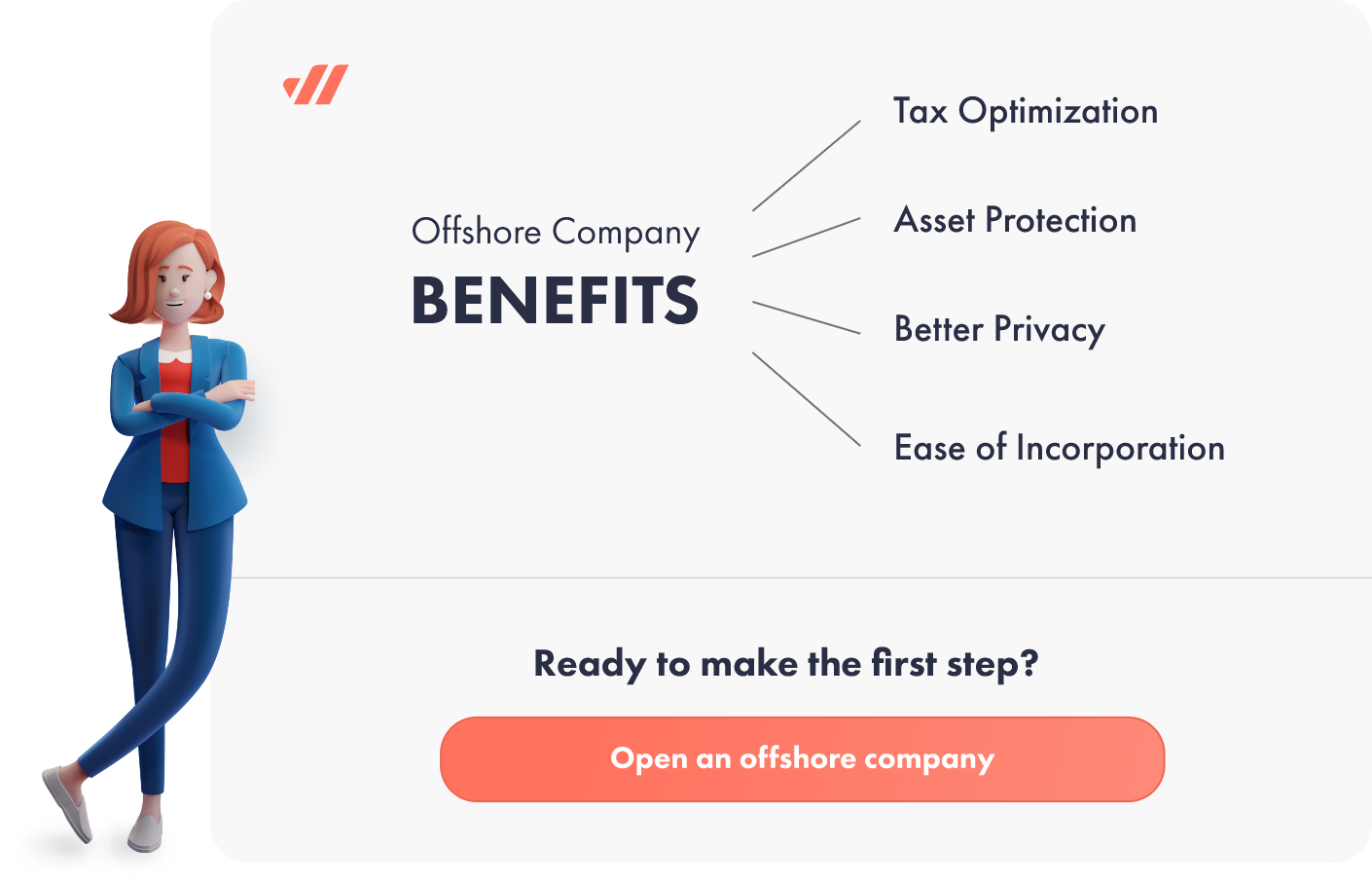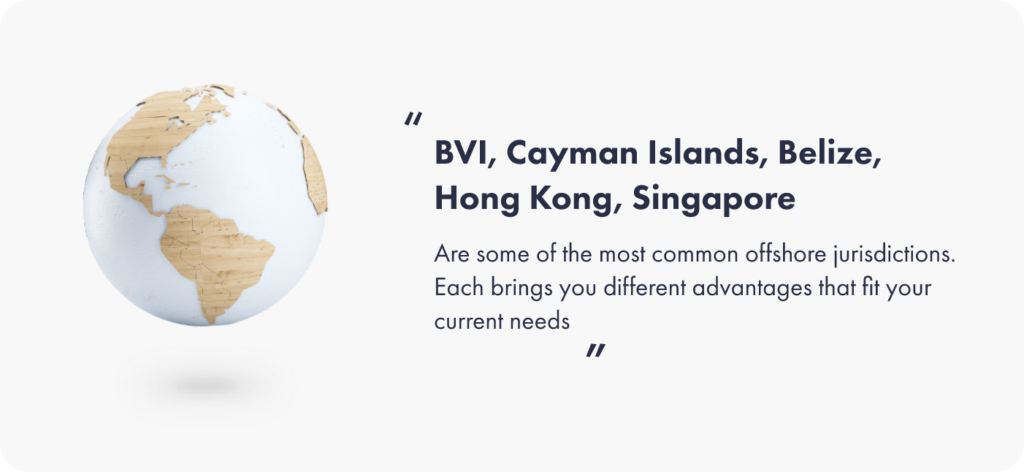Everything you need to know before setting up an offshore company
PART 1: What is the essence of the offshore concept?
Many people associate the term “offshore” with criminal and money laundering activities. It is generally believed that offshore accounts and companies are used to evade taxes, avoid government taxes, etc. In reality, all these myths are dispelled. It is absolutely legal to conduct offshore business, for the following reasons:
Let’s start with a definition.
An offshore company is one that is located outside the country of the owner, or outside the country in which the business’ main activity is conducted, as well as official registered offices and representative offices of the parent company.”
Basically, an offshore company is any company that is based outside of the country where the founder resides.
Let’s see how offshore companies work?
An illustrative example: you opened a company in Australia, worldwide your company’s income will be taxed from 25% to 30%. But if you opened a company, for example, in Hong Kong, then its income will be taxed from 8.25% to 16.5%. In addition, income earned outside of this country will be exempt from tax.
This practice is also common among corporate giants such as Apple, Samsung, Google. All of them have offshore companies opened as subsidiaries in different parts of the world. Taking advantage of favorable tax conditions in these countries, they reduced their tax spending.
But it is not necessary to be a huge international company with a large staff to have an offshore company. If you have a plan and vision for your company, you can start opening an offshore company now!

PART 2: What are the benefits of an offshore company?
Such a great question has a great answer! tax optimization. But an offshore company can give you more, such as privacy, asset protection, simple incorporation, and cheap maintenance of corporate processes.
Do not confuse tax optimization with tax evasion. Do not forget that breaking the law is fraught with consequences. Opening an offshore company still entails transparency and compliance with the law.
Let’s get acquainted with the categories of offshore companies.
There are 2 categories: tax-free and low-taxed:
Tax Free: Tax-exempt jurisdictions are very attractive, but it is worth considering the fact that some such jurisdictions are changing their policies quickly. For example, they introduce taxes and new rules regarding commercial business. Such jurisdictions have a bad reputation.
Case in point: banks in Singapore and Hong Kong are concerned about opening accounts for companies in tax havens. The same applies to clients. They will not treat you as a good customer if your business is in harbors with such a reputation.
And this well demonstrates how carefully one should be planning and researching the choice of offshore jurisdiction (or looking for proven specialists).
Jurisdictions with low tax.: The other side of the coin is low tax jurisdictions. They are more stable, better known and have a good reputation compared to tax havens. Singapore or Hong Kong companies can do business all over the world as long as they have a good legal reputation.
Among such countries, the territorial tax system is widespread. What does it mean? This means that only the income that is received only in this country is subject to taxation. Income received from foreign sources is not taxed. In particular, such companies have a network of tax agreements among themselves, which allows them to reduce the percentage of taxes or not pay them at all. This is a big plus, allowing you to optimize your taxation.
What conclusion can we come to? If you agree to pay a small tax in exchange for the stability and recognition of other countries, your choice of a low tax jurisdiction is the right one.
Better privacy
In order to register your company, you must provide your details to the Registrar of Companies. Thanks to this, you will feel safe, since all your personal information will be kept secret.
In many offshore companies, this practice is common: they do not distribute any information about the beneficiaries, directors and shareholders of the company, except in such situations as a court order or international agreements.
Asset protection.
Many companies provide personal cover for your assets. In addition to the privacy policy, you can also use the refusal to issue a foreign judgment. This means that all your assets are protected from the decisions of foreign jurisdictions. Only the local court can make such decisions.
Let’s imagine you have opened a trust in Belize. This means that all property of the trust will be protected from any claims of the jurisdiction of other countries. Only Belize will be able to make such decisions.
If you are wondering about the security of your assets, then your answer is an offshore trust. Also here are examples of common offshore companies that offer you financial security: BVI, Seychelles, Cayman Islands and Nevis.
Ease of opening and maintaining your company.
The process of registering your offshore company is very simple and fast, it takes only a few days depending on the jurisdiction, and the requirements are minimal.
It is best to pay attention to a good service provider. You only need to find it, pay for services and provide the required minimum of documents. And the service provider will already continue to work, register your company on your behalf.
As for the service of the company, it varies from different jurisdictions. But there is one thing in common – all requirements will be minimal. You can always turn to outsourcing services for accounting or tax accounting for help.

PART 3: What are the best countries for an offshore company?
The concept of the best offshore jurisdiction is constantly being challenged by entrepreneurs, but each offshore jurisdiction has its own set of rules.
When choosing an offshore jurisdiction, you should pay attention to:
- Taxation;
- Investment opportunities;
- Your main goals when opening an offshore company;
- The reputation of that jurisdiction;
- Citizenship;
- Requirements and service fees;
- Registration process;
- Business entity type.
Countries you can consider for your offshore company:
Belize: If you are looking for a competitively priced jurisdiction with ease of banking services, then look no further.
Cayman Islands: A very popular choice among those investors looking for tax-free benefits. A nice bonus is the location by the Caribbean Sea.
British Virgin Islands: They have a lot in common with the Caymans, but the BVI has the advantage of being more affordable.
The UK: Rated as one of the best countries for doing business by the World Bank.
Seychelles: a very convenient point for trade between Africa, Europe and Asia. Registering an IBC in the Seychelles is a good tax haven option.
Hong Kong: favorable environment for start-ups, small and medium enterprises, foreign investors. Two things that you can’t help but love: the two-tier income tax system and its strategic location as a gateway to mainland China.
Singapore: the best offshore conditions for fintech companies. Friendly tax regime, good reputation and trading platforms make Singapore a great choice.

PART 4: What are the best countries for an offshore company?
After the final choice of offshore jurisdiction and the preparation of the plan, the process of creating your company begins. We will give you an example of a general registration process, as it may differ depending on the jurisdiction.
Select the legal entity type.
In fact, there are a lot of types and their varieties. You need to choose those key characteristics from which you will build:
- The entity legal status
- The liability of the entity
- The tax and other benefits of the entity
These will allow your company to keep its own obligations. You will be able to enter into contracts, agreements, buy, sell property, take out loans and sue on your own behalf. You, like other shareholders, will not be personally liable beyond your share of the capital.
If your company is heavily indebted or goes bankrupt, the only financial loss you will suffer is your contribution to the company’s capital. Your other assets will remain safe in your country. A separate legal entity is the guarantor of your security.
But that doesn’t rule out the fact that you may find that other partnerships are more beneficial to you. It all depends on your specific situation.
Select the legal entity type.
Each jurisdiction has its own requirements and company registration process. In some of these jurisdictions, the use of specialized licensed service providers is recommended.
Even if this is not a country requirement, the services of a corporate provider will still save you time and nerves, since you do not have to deal with registration and legal intricacies on your own.
All that is required of you is to find a service provider and provide him with the necessary documentation. And already they will take over the whole process and you do not have to understand the paperwork. Nowadays everything can be done online.
After the registration is completed, the service provider will continue to support you in matters such as opening a bank account, taxation, etc.
Go through the KYC procedure.
After you pay for the services of the service provider, you will be asked to provide certain information and documents. This is the so-called “Know Your Customer” procedure. As a rule, it includes the following list of documents:
- The address proof of the shareholders and key members;
- The company name;
- The main business activities;
- Other supporting documents (if needed).
After that, the provider will proceed to register your company on your behalf, by submitting an application to the local registrar of companies (local government).
PART 5: What about a Bank account?
Once your company is ready, it still cannot fully function. Need a place to store money when working with clients, customers and partners.
Opening a bank account is always the most problematic point for an offshore company. But an offshore bank account is very important as it separates your personal assets from your business funds.
You can easily open your account in the same jurisdiction as the company, but many jurisdictions allow you to open an account in any other country. This is not a problem if your company is in the BVI and the account is opened in Singapore.
You can also open an account in another country to optimize taxation, for better security of your assets, services and interest rates. We have prepared for you a short list of the most popular offshore jurisdictions for banking:
- Switzerland
- Belize
- Hong Kong
- Singapore
- Cayman Islands
- The British Virgin Islands
- Puerto Rico
- Mauritius
Basically, the service provider also provides the service of opening a bank account. Don’t neglect this opportunity. Each bank has its own conditions for approving applications from potential clients, and if you have no experience in working with offshore accounts, then you risk getting confused and stuck at this point. A good professional will guide you through this step and select the right bank for your circumstances, submit a well-drafted application on your behalf, and monitor further developments.
Opening an offshore bank account is not an easy task, but there is always an opportunity to facilitate this process with the help of specialists.
A corporate bank account is the best way to separate business money from personal assets.
An of sure bank account is also
100% Legal

PART 6: Popular use of an offshore company
We figured out the intricacies of opening an offshore company. Let’s now dig deeper and explore the use of such companies!
Go through the KYC procedure.
The use of an offshore company for trading business is a popular phenomenon. With the development of technology, you can create an online business without any hassle. You can register a company in one country, receive goods from another and sell to a third, all without leaving your home.
When choosing a jurisdiction for such activity, consider the following:
- The tax policies;
- The incorporation process and filing reports;
- The requirements for licenses and permits;
- The markets targeted and other related issues.
We have two good examples: Hong Kong and Singapore. They adhere to a territorial tax system and also have an established network of international trade agreements that give reduced tax rates and even tax exemptions when they transact with another participating country.
Hong Kong is the gateway to the Chinese market and Singapore has the best financial services system in the world. These are the characteristics that can bring great value to your business in a global sense.
Holding Business
Our offshore company may hold a number of shares in another foreign company for dividend income as the main income. You can also own such types of assets as: patents and trademarks, rent them or sell them overseas to make profits.
For such activity, you should consider countries with enhanced intellectual property (IP) for protection and privacy.
Cryptocurrency
Cryptocurrency is now at the peak of popularity, on which it has been holding for more than a year and is being sold because of the great potential benefits. Among offshore companies, it is gaining a big trend as a means to increase profits.
Nevertheless, unfortunately, not everything is so simple. Many jurisdictions do not allow such activity, associating it with high risk, and opening an account for such activity can be a problem.
PART 7: Rapidly changing trends in offshore companies.
To comply with the new EU changes, many offshore zones have undergone major changes in terms of taxation and legislation. Let’s figure it out.
Removing Fences
In the past, there were restrictions on doing business with local residents in financial centers such as Belize, San Vincent or the Grenadines. Nowadays, residents and non-residents receive the same right to conduct business with this type in Belize, as well as permission to trade with locals. The tax policy was also changed. From 2018, the Income and Income Tax (Amendment) Law began to provide that IBCs doing business in the country should now be subject to income tax. Obviously, tax rates on foreign income other than passive income will vary from 1.75% to 6%, depending on your registered type of business.
Economic Presence Rules
Generally, economic substance requirements apply to certain types of activities such as net worth holding companies, financial services, banking and insurance businesses, regulated businesses, etc. The economic substance rule has been adopted in many offshore jurisdictions such as Belize, Cayman Islands, British Virgin Islands and many more.
Beneficial Ownership Position
Ongoing changes and legislative adjustments can be found in the Beneficial Ownership Law in several countries. Therefore, those countries that fall under this law must confirm the identity of their beneficiaries to the competent authority through agents.
What Conclusions Can We Draw?
We have just reviewed the main advantages of offshore companies, got acquainted with the procedure for going offshore, learned about the main mistakes and important information, highlighted the most popular jurisdictions: Belize, the British Virgin Islands, the Cayman Islands, Seychelles, Nevis, and many others, as well as learned that depending on your goals, we can adjust your way of opening a company in an offshore zone. It is impossible not to say that this is a very time-consuming process, but the name of good specialists is in service, you can easily shorten this path to a few steps.
Are you interested in making your business international? Want to optimize your company’s tax load? Do you want to get detailed advice on registering an offshore company in more than 10 jurisdictions?
Contact us for detailed advice and we will be happy to answer all your questions!
FAQ
1. Do offshore companies pay taxes at all? There are different offshore zones and each has its own rules. In some countries, taxes apply only to income earned in that country, and foreign income is exempt from taxes. It all depends on the policy of the country.
2. Is it legal to have an offshore company? Absolutely. An offshore company is simply a company located in another country. However, it should be noted that using your company to launder money is not legal.
3. What are the benefits of an offshore account? The most important advantage is tax optimization. Other reasons are privacy protection, asset protection, easy registration and low cost maintenance.
4. How to start your offshore business?
Main steps in registration:
- Choose the jurisdiction;
- Choose your company name;
- Find a service provider (highly recommended);
- Submit the required documents (KYC procedure);
- Get a certificate of registration!
5. How much does it cost to open an offshore company? It all depends on the jurisdiction you choose. The cost varies from a few hundred to thousands of dollars, excluding service fees.
6. Should I have an offshore account? Absolutely! This will allow you to make deals with partners as well as receive money from them. It is also the best way to separate your personal funds from company assets. It is also a good tax optimization opportunity and an opportunity to enhance your privacy.
